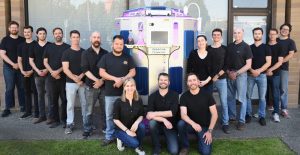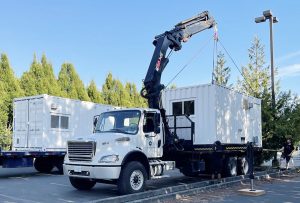Victoria Tech Firm Ships First Shipping Container Hatchery

The Industrial Plankton Inc. team at its Victoria location
VICTORIA – Industrial Plankton Inc. celebrated its 12th anniversary in September by delivering its first shipping container hatchery to a customer.
Founded in 2010, the company designs and manufactures turnkey bioreactors in Canada for clean, on-site, live plankton production for aquaculture, research lab, and biotechnology uses.
CEO Robert Roulston says “I’m extremely proud of the Industrial Plankton team for pulling all of this engineering and biology together to create a fantastic product. Anyone who has taken on new projects during the last year knows how challenging it has been dealing with many external factors – supply chain being one of them.”
 The company recently expanded to new premises at 3374 Burns Avenue to allow it to keep up to customer demand, as their bio-reactors are now used in 26 countries around the world.
The company recently expanded to new premises at 3374 Burns Avenue to allow it to keep up to customer demand, as their bio-reactors are now used in 26 countries around the world.
Their first commercial 1000L Algae bioreactors were installed in 2012. Since then, they’ve launched the 100L Research Algae bioreactor, PBR 1250 L – which doubles phytoplankton production from the initial PBR 1000L unit, and the large-volume 2500 Dual Algae bioreactor.
Industrial Plankton’s technology is optimized for reliability, ease of use, and biosecurity, and their equipment is highly automated, increasing reliability and saving operators countless hours. The result is equipment that is capable of easily and reliably producing bio secure, high-density algae.
Algae are an important biotech feedstock for pharmaceuticals, nutraceuticals, omega-3 oils, carotenoids, pigments, and biofuels, and used in waste remediation to sequester nutrients, heavy metals, and greenhouse gases.
They’ve worked with customers from shellfish, shrimp, and finfish hatcheries for years to help improve their algae cultures. Their equipment is used to feed many aquacultured invertebrates including larval and juvenile mussels, clams, oysters, white legged shrimp, scallops, sea cucumbers and many more. Applications in rearing larval finfish include greenwater generation, and enriching zooplankton to feed rotifers, copepods and artemia.
“Reliably producing enough bio secure live feed is the bottleneck for many hatcheries,” their website states. The feed must be good quality – highly nutritious and with low pathogens levels.
“To solve the problem of unreliable production and low feed quality, their algae equipment automates routine tasks and creates a stable bio secure culture environment, making it easy to consistently produce enough live feed to meet hatchery needs.”
Not having enough good quality algae at hatcheries when they need it is a common problem, and Industrial Plankton’s self-cleaning bio-reactors make it simpler to produce secure, live algae on-site.


